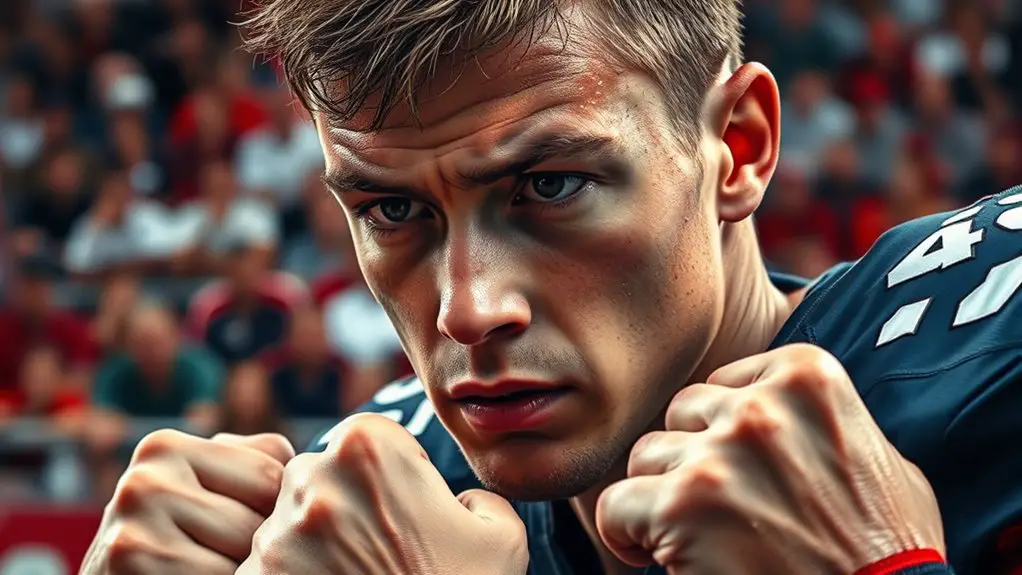The psychology of elite-level athletes is all about motivation, resilience, and focus. You endeavor to push your limits, overcoming setbacks with mental strength. Staying concentrated during competition helps you block out distractions and perform at your best. It also matters how well you work with your teammates; strong dynamics can boost your drive and support. Understanding these elements can transform your athletic experience, leading you to even greater heights in your performance journey.
The Role of Motivation in Athletic Performance
Motivation is a powerful force that drives elite-level athletes to push their limits and achieve greatness. It's the spark that ignites your passion, fueling those early morning workouts and late-night training sessions. When you're chasing your dreams, that inner drive helps you break free from comfort zones and embrace challenges. It's not just about winning; it's about discovering your potential and proving to yourself that you can defy the odds. Your motivation can come from various sources—personal goals, a fierce desire for freedom, or the thrill of competition. Whatever it is, harness it. Let it guide you, lift you, and inspire you to rise above obstacles. Remember, your journey is yours to shape, and motivation is the key to releasing your true potential.
Mental Resilience: Bouncing Back From Setbacks
While setbacks are an inevitable part of any athlete's journey, your ability to bounce back defines your mental resilience. Embracing challenges instead of fearing them allows you to grow stronger. When faced with adversity, remember that it's okay to feel disappointment; what matters is how you respond. Use setbacks as lessons, not roadblocks. This mindset shift can empower you to reclaim your path and fuel your passion. Surround yourself with supportive individuals who uplift you, and don't hesitate to lean on them when times get tough. Trust in your ability to adapt and persevere. With each setback, you're not just surviving; you're forging your own freedom, shaping your identity as an athlete, and proving that true strength lies in resilience.
The Importance of Focus and Concentration
When you're in the heat of competition, the ability to focus and concentrate can make all the difference between victory and defeat. You might think distractions are just part of the game, but honing your focus allows you to block out noise and zero in on what truly matters. It's about being present, fully engaged in the moment, and trusting your instincts. When you concentrate, you're not just performing; you're expressing your passion and dedication. It's this clarity that fuels your freedom to adapt and respond to challenges. Whether it's the roar of the crowd or the pressure of the moment, mastering your focus can elevate your performance to new heights. Embrace it, and let it guide you toward success.
Visualization Techniques Used by Elite Athletes
Visualization techniques have become essential tools for elite athletes, allowing them to mentally rehearse performances and enhance their skills. By vividly picturing their actions, athletes can boost their confidence and fine-tune their abilities. Here are some popular visualization techniques you might find inspiring:
- Mental Rehearsal: Picture every detail of your performance, from start to finish.
- Positive Imagery: Focus on successful outcomes, reinforcing your belief in your capabilities.
- Sensory Engagement: Involve all your senses—hear the crowd, feel the equipment, and see the environment.
Incorporating these techniques into your training can release your potential, making you feel more prepared and empowered. So, why not give it a try? Embrace the freedom to visualize your path to success!
Coping With Pressure and Expectations
As the spotlight shines brighter, elite athletes often feel the weight of pressure and expectations bearing down on them. You might wonder how to navigate this intense landscape without losing your sense of self. First, embrace the idea that pressure can be a powerful motivator. Instead of fearing it, see it as an opportunity to showcase your skills. Practicing mindfulness can help you stay grounded; focus on the present moment rather than the outcome. Building a strong support system is vital too—surround yourself with people who uplift you. Remember, it's about the love for the game, not just the accolades. By shifting your mindset and prioritizing your well-being, you can thrive under pressure while maintaining your freedom to enjoy the journey.
The Impact of Team Dynamics on Individual Performance
While the individual talent of elite athletes is undeniable, the dynamics of a team can greatly shape their performance. When you're part of a cohesive unit, it can elevate your game in ways you might not expect. Here's how team dynamics can influence you:
The synergy of a cohesive team can unexpectedly elevate your performance as an athlete.
- Support and Motivation: A strong team provides emotional backing, pushing you to aim for more.
- Communication: Open dialogue fosters trust, allowing you to express yourself freely and make better decisions.
- Shared Goals: Working towards a common objective can ignite a sense of purpose, enhancing your focus and drive.
Embracing these dynamics can not only improve your performance but also enrich your experience as an athlete. So, connect with your team and watch your potential unfold!
The Psychology of Goal Setting
Setting goals isn't just about having something to aim for; it's a critical psychological tool that can enhance your performance as an athlete. When you set clear, achievable goals, you create a roadmap that guides your training and keeps you focused. Goals give you a sense of purpose, helping you push through challenges and stay motivated. They also allow you to measure progress, giving you the freedom to adjust your strategies as needed. Remember, it's crucial to set both short-term and long-term goals, as they provide both immediate satisfaction and a vision for the future. By embracing this process, you can unleash your potential and truly enjoy the journey of becoming the best version of yourself in your sport.
Strategies for Maintaining Mental Health in Sports
Maintaining mental health in sports is essential not only for performance but also for overall well-being. When you prioritize your mental health, you reveal your true potential. Here are some strategies to help you thrive:
- Practice Mindfulness: Engage in meditation or breathing exercises to stay present and reduce anxiety.
- Establish a Support Network: Surround yourself with friends, family, and teammates who uplift you and understand your journey.
- Set Realistic Goals: Focus on achievable objectives that keep you motivated without overwhelming you.
Frequently Asked Questions
How Do Elite Athletes Handle Criticism From Fans and Media?
When facing criticism from fans and media, you focus on constructive feedback, blocking out negativity. You remind yourself of your goals, use support systems, and maintain a growth mindset to keep improving despite outside opinions.
What Role Does Personality Play in Athletic Success?
Personality's everything in athletic success! It's like the secret sauce that spices up your game. Your confidence, resilience, and passion can turn you into a superstar, while doubts could quash your dreams. Embrace your unique flair!
How Do Athletes Balance Personal Life With Training Commitments?
Balancing personal life with training's tough, but it's essential. You'll need to prioritize time, set boundaries, and communicate with loved ones. Finding joy outside of sports can enhance your performance and overall well-being.
Do Elite Athletes Experience Burnout, and How Do They Cope?
You might think elite athletes never feel burnout, but they do. Coping involves finding balance, prioritizing mental health, and embracing downtime. You can learn from them to navigate your own pressures and maintain your freedom.
What Are Common Mental Health Disorders in Elite Athletes?
Common mental health disorders you might encounter include anxiety, depression, and eating disorders. These challenges often stem from performance pressure, making it essential to prioritize your mental well-being and seek support when needed.




